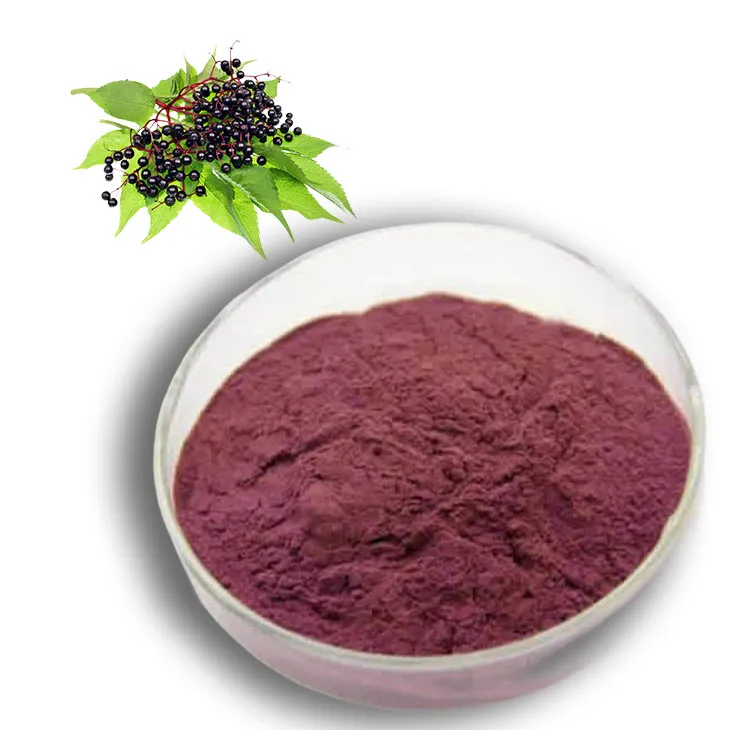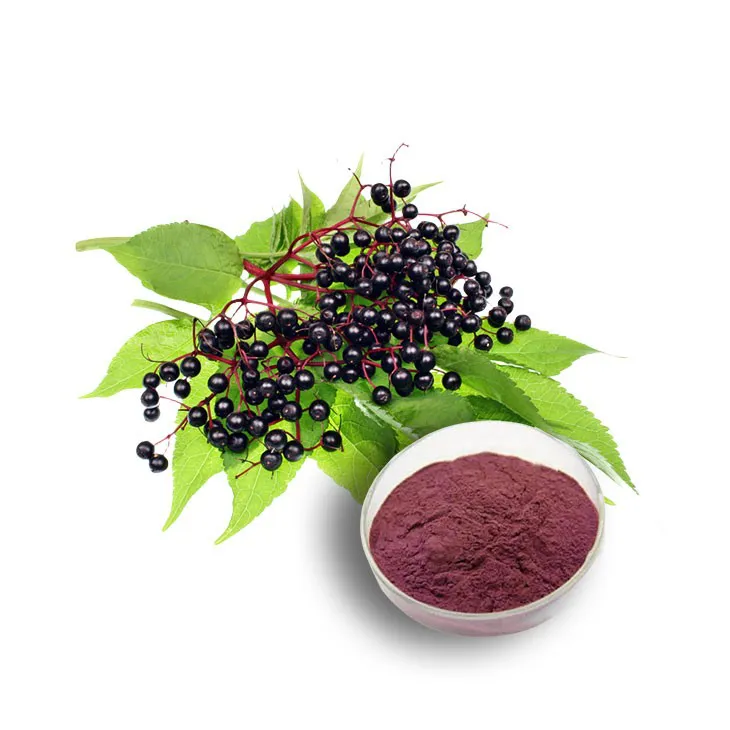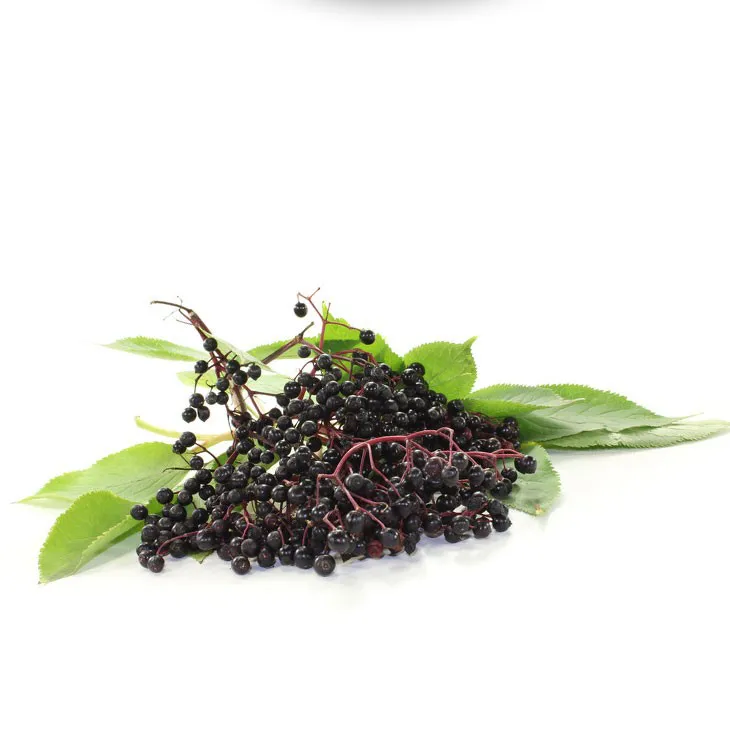- 0086-571-85302990
- sales@greenskybio.com
What is elderberry extract? Definition, types, history and nutritional value.
2024-12-18

1. Definition of Elderberry Extract
Elderberry Extract is a concentrated form of the beneficial compounds found in elderberries. Elderberries, scientifically known as Sambucus nigra, are small, dark - purple berries that grow on elderberry bushes. The extract is typically produced through various extraction methods to isolate and concentrate the active ingredients present in the berries.

2. Types of Elderberry Extract
2.1. Liquid Extract
Liquid elderberry extract is one of the most common forms. It is often made by soaking elderberries in a solvent, usually alcohol or a glycerin - based solution. The solvent helps to draw out the active components from the berries. Alcohol - based liquid extracts have a longer shelf - life and can be more effective at extracting certain compounds. Glycerin - based liquid extracts are a popular alternative for those who prefer a non - alcoholic option, especially for children or those with alcohol sensitivities.
2.2. Dried Extract
Dried elderberry extract is obtained by removing the moisture from the berries after extraction. This form is convenient for storage and can be easily incorporated into various products such as capsules, tablets, or used in powdered form for making teas or adding to food. The drying process helps to preserve the active ingredients for a longer period.
2.3. Standardized Extract
Standardized elderberry extract is carefully processed to ensure a consistent level of specific active compounds. For example, it may be standardized to contain a certain percentage of anthocyanins, which are the pigments responsible for the deep - purple color of elderberries and are also associated with many of their health - promoting properties. This type of extract is often used in dietary supplements to provide a reliable and reproducible dose of the beneficial components.

3. History of Elderberry Extract
Elderberries have a long and rich history in herbal medicine. The use of elderberry can be traced back to ancient times.
3.1. Ancient Civilizations
In ancient Egypt, elderberries were used for their medicinal properties. The Egyptians were known to have knowledge of the healing powers of plants, and elderberries were likely part of their pharmacopeia. The Greeks and Romans also had an understanding of elderberry's value. Hippocrates, often referred to as the "father of medicine," mentioned elderberry in his writings, indicating its early recognition in the field of medicine.
3.2. Middle Ages
During the Middle Ages, elderberry was a staple in European herbal medicine. It was used to treat a variety of ailments, including colds, fevers, and inflammation. Monks and herbalists of that time were well - versed in the use of elderberry and passed down their knowledge through generations. Elderberry was also associated with folklore and superstition. For example, it was believed that elderberry bushes had the power to ward off evil spirits, which added to its significance in the cultural and medicinal landscape.
3.3. Modern Era
In modern times, scientific research has begun to explore the active components of elderberry extract and validate its traditional uses. With the growth of the natural health and dietary supplement industries, elderberry extract has gained popularity as a natural remedy for various health conditions. It is now widely available in different forms, such as tinctures, capsules, and syrups, both in the mainstream market and in the natural health sector.

4. Nutritional Value of Elderberry Extract
Elderberry extract is a rich source of several important nutrients and bioactive compounds, which contribute to its potential health benefits.
4.1. Vitamins
Elderberry extract contains vitamins such as vitamin C, which is an important antioxidant. Vitamin C helps support the immune system, promotes healthy skin, and aids in the absorption of iron. Additionally, elderberries also contain small amounts of vitamin A, which is essential for vision, skin health, and the proper function of the immune system.
- Vitamin C: Acts as a powerful antioxidant, protecting cells from damage caused by free radicals. It also plays a crucial role in collagen synthesis, which is important for maintaining the integrity of connective tissues.
- Vitamin A: In the form of retinoids, it is involved in the regulation of gene expression, cell differentiation, and immune function. It also helps in the maintenance of normal vision, especially in low - light conditions.
4.2. Minerals
Elderberry extract contains minerals like potassium, which is important for maintaining proper heart function, regulating blood pressure, and ensuring normal muscle and nerve function. It also contains small amounts of iron, which is necessary for the production of hemoglobin in red blood cells, responsible for carrying oxygen throughout the body.
- Potassium: Helps in the balance of fluids in the body, counteracts the effects of sodium, and is involved in the electrical activity of the heart. A proper potassium level is essential for overall cardiovascular health.
- Iron: As a key component of hemoglobin, iron deficiency can lead to anemia, which results in fatigue, weakness, and decreased immune function. Elderberry extract can contribute to the overall iron intake, although it may not be a major source on its own.
4.3. Phytochemicals
Elderberry extract is rich in phytochemicals, which are plant - derived compounds with various health - promoting properties.
- Anthocyanins: These are the pigments that give elderberries their deep - purple color. Anthocyanins are powerful antioxidants that have been shown to have anti - inflammatory, anti - cancer, and cardioprotective effects. They can help reduce oxidative stress in the body, which is associated with many chronic diseases.
- Flavonoids: Elderberry extract contains flavonoids such as Quercetin, which has antioxidant, anti - inflammatory, and antiviral properties. Flavonoids can also help improve blood vessel function, reducing the risk of cardiovascular diseases.
- Phenolic acids: These compounds contribute to the antioxidant activity of elderberry extract. They can also have antimicrobial and anti - platelet aggregation effects, which may be beneficial for overall health.
5. Potential Health Benefits of Elderberry Extract
The nutrients and phytochemicals present in elderberry extract are associated with several potential health benefits.
5.1. Immune - Boosting Effects
The high vitamin C content, along with other bioactive compounds like flavonoids and anthocyanins, may help support the immune system. Some studies suggest that elderberry extract can stimulate the production of cytokines, which are signaling molecules that play a key role in the immune response. This may help the body fight off infections more effectively, especially common colds and flu.
5.2. Anti - Inflammatory Properties
The anthocyanins and flavonoids in elderberry extract have anti - inflammatory effects. Chronic inflammation is associated with many diseases, including heart disease, diabetes, and arthritis. By reducing inflammation, elderberry extract may help prevent or manage these conditions.
5.3. Antiviral Activity
Some research indicates that elderberry extract may have antiviral properties, particularly against influenza viruses. It is thought that the compounds in elderberry extract can interfere with the ability of viruses to infect cells and replicate, potentially reducing the severity and duration of viral infections.
5.4. Cardiovascular Health
The flavonoids and potassium in elderberry extract can contribute to cardiovascular health. Flavonoids can improve blood vessel function, reduce blood pressure, and lower cholesterol levels. Potassium helps in maintaining proper heart rhythm and blood pressure regulation.
6. Precautions and Considerations
While elderberry extract offers potential health benefits, there are also some precautions to keep in mind.
6.1. Toxicity in Unripe Berries
Elderberries must be fully ripe before consumption or extraction, as unripe berries can contain toxins that may cause nausea, vomiting, and diarrhea. It is important to ensure that the elderberries used in the extract are sourced from reliable and safe suppliers.
6.2. Allergic Reactions
Some individuals may be allergic to elderberries or components in the extract. Allergic reactions can range from mild skin rashes to more severe symptoms such as difficulty breathing. If you have a known allergy to plants in the Adoxaceae family (which includes elderberries), it is best to avoid elderberry extract.
6.3. Interaction with Medications
Elderberry extract may interact with certain medications. For example, it may enhance the effects of drugs that lower blood sugar, so if you are diabetic and taking such medications, it is important to consult your healthcare provider before using elderberry extract. Similarly, it may interact with medications for autoimmune diseases, as it has immune - modulating properties.
FAQ:
What is the main component of elderberry extract?
Elderberry extract mainly contains vitamins (such as vitamin C), minerals, and various phytochemicals like anthocyanins. These components contribute to its potential health - promoting properties.
How are different types of elderberry extract made?
Different types of elderberry extract are made through various extraction methods. For example, some may be made using solvent extraction, where solvents are used to draw out the active compounds from the elderberries. Another method could be cold - pressing, which is more suitable for obtaining certain nutrients while preserving their natural properties.
What are the historical uses of elderberry extract in herbal medicine?
Historically, elderberry extract has been used in herbal remedies for treating various ailments. It was often used to relieve cold and flu symptoms, reduce inflammation, and improve overall well - being. In some traditional medicine systems, it was also used for digestive problems and skin conditions.
Can elderberry extract really have anti - inflammatory effects?
Yes, elderberry extract can potentially have anti - inflammatory effects. The phytochemicals present in it, such as anthocyanins, are known to have antioxidant and anti - inflammatory properties. These substances can help in reducing inflammation in the body by neutralizing free radicals and modulating the body's immune response.
Is elderberry extract safe for everyone to consume?
While elderberry extract is generally safe for most people, it may not be suitable for everyone. Some individuals may be allergic to elderberries, and in such cases, consuming the extract can cause allergic reactions. Also, pregnant and breastfeeding women should consult a healthcare provider before using elderberry extract as its safety in these situations has not been fully established.
Related literature
- The Nutritional and Therapeutic Potential of Elderberry"
- "Elderberry Extract: A Review of Its Composition, Properties, and Health Benefits"
- "Historical and Modern Uses of Elderberry in Herbal Medicine"
- ▶ Hesperidin
- ▶ citrus bioflavonoids
- ▶ plant extract
- ▶ lycopene
- ▶ Diosmin
- ▶ Grape seed extract
- ▶ Sea buckthorn Juice Powder
- ▶ Beetroot powder
- ▶ Hops Extract
- ▶ Artichoke Extract
- ▶ Reishi mushroom extract
- ▶ Astaxanthin
- ▶ Green Tea Extract
- ▶ Curcumin Extract
- ▶ Horse Chestnut Extract
- ▶ Other Problems
- ▶ Boswellia Serrata Extract
- ▶ Resveratrol Extract
- ▶ Marigold Extract
- ▶ Grape Leaf Extract
- ▶ blog3
- ▶ blog4
- ▶ blog5
-
All about L - Citrulline - DL - Malic Acid.
2024-12-18
-
Eyebright Extract
2024-12-18
-
Grape Seed Extract
2024-12-18
-
Bayberry Extract
2024-12-18
-
Curcumin
2024-12-18
-
Black Garlic Extract
2024-12-18
-
Licorice Root Extract Powder
2024-12-18
-
White mustard seed extract
2024-12-18
-
Centella Asiatica Extract
2024-12-18
-
Acerola Extract
2024-12-18
-
Citrus Aurantii Extract
2024-12-18





















